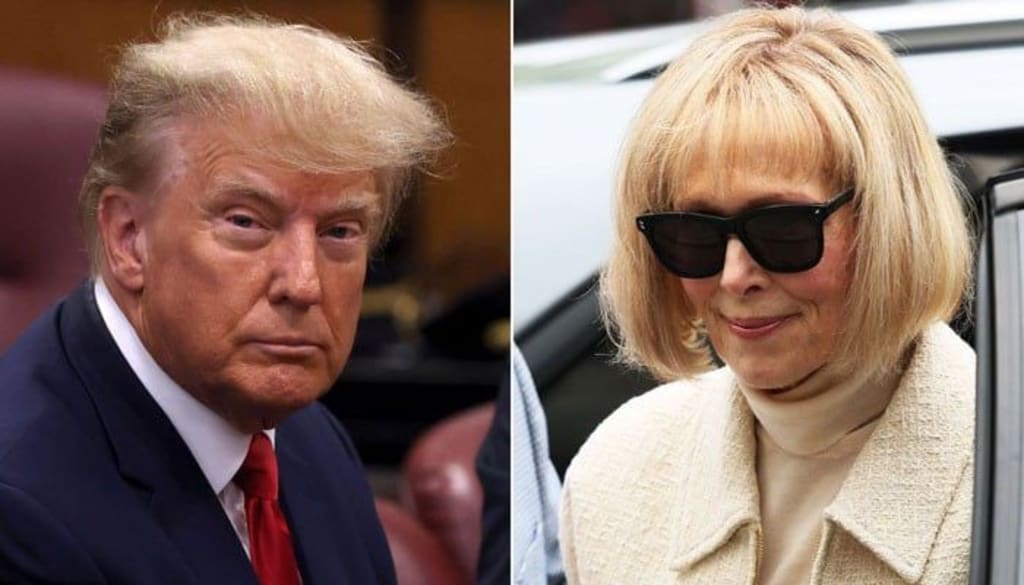Trump Files Defamation Lawsuit Against E. Jean Carroll: Unraveling a Complex Legal Battle
Unraveling a Complex Legal Battle

Introduction
In a stunning development in the ongoing legal saga surrounding former President Donald Trump, he has filed a defamation lawsuit against writer E. Jean Carroll. The lawsuit stems from Carroll's accusation that Trump sexually assaulted her in the mid-1990s. This high-profile case has captured the attention of the public and legal experts alike, as it raises important questions about defamation law, the boundaries of free speech, and the power dynamics between individuals and public figures. In this article, we will delve into the details of the lawsuit, explore the arguments presented by both parties, and examine the potential implications of this case on future defamation claims.
Background of the Case
The origins of the legal battle between Donald Trump and E. Jean Carroll can be traced back to 2019 when Carroll accused Trump of sexually assaulting her in a Manhattan department store in the 1990s. Trump vehemently denied the allegations, dismissing them as "fake news" and claiming that he had never even met Carroll, despite a photograph of them together being widely circulated. Carroll subsequently filed a defamation lawsuit against Trump, arguing that his denials had damaged her reputation and caused emotional distress.
Trump's Counterattack
Now, in an unexpected twist, Donald Trump has turned the tables on Carroll by filing his own defamation lawsuit against her. Trump's legal team argues that Carroll's accusations were false and politically motivated, intending to harm his reputation and influence the outcome of the 2020 presidential election. They claim that Carroll's actions amount to defamation per se, as the allegations involve serious criminal conduct, and that she should be held accountable for her damaging statements.
Defamation and the First Amendment
Defamation is a complex area of law that involves making false statements about someone that harm their reputation. To establish a defamation claim, the plaintiff must typically demonstrate that the statement was false, that it was communicated to a third party, and that it caused harm to their reputation. However, the First Amendment of the United States Constitution protects freedom of speech and imposes limitations on defamation claims against public figures.
Given Donald Trump's status as a public figure, he faces a higher threshold in proving defamation. In the landmark case of New York Times Co. v. Sullivan, the Supreme Court established the "actual malice" standard for defamation claims involving public figures. To succeed, Trump must show that Carroll made false statements knowingly or with reckless disregard for the truth. This requirement places a significant burden on public figures when attempting to prevail in defamation lawsuits.
Trump's Arguments
In his lawsuit, Trump contends that Carroll's accusations were not only false but were also politically motivated. He asserts that Carroll made the allegations as part of a broader campaign to damage his reputation and influence the 2020 presidential election. Trump's legal team is expected to present evidence demonstrating Carroll's alleged ulterior motives and disputing the veracity of her claims.
Carroll's Defense
E. Jean Carroll's legal team will likely argue that her accusations are protected speech under the First Amendment. They may assert that her statements were made as part of a larger public conversation about sexual assault and the behavior of public figures. Carroll could also present evidence to support her credibility and rebut any claims made by Trump's legal team regarding her motivations.
The Potential Implications
The outcome of this lawsuit could have far-reaching implications for future defamation claims involving public figures and victims of sexual assault. If Trump were to prevail, it could create a chilling effect on survivors coming forward with allegations against powerful individuals, fearing legal repercussions. On the other hand, a victory for Carroll could strengthen the voices of victims and potentially hold public figures accountable for their alleged misconduct.
Furthermore, this case raises questions about the intersection of defamation law and the #MeToo
movement. It highlights the tension between protecting free speech and providing avenues for individuals to seek redress for reputational harm. The legal precedent set by this lawsuit could shape the landscape of defamation law in the context of sexual assault allegations and public figures going forward.
Conclusion
The defamation lawsuit between Donald Trump and E. Jean Carroll is a complex legal battle that explores the boundaries of free speech, the rights of public figures, and the impact of sexual assault allegations. As both parties present their arguments and evidence, the outcome of this case will undoubtedly shape the future of defamation law and have ramifications for survivors of sexual assault seeking justice. Whatever the final verdict, the lawsuit highlights the ongoing societal conversation surrounding accountability, power dynamics, and the right to speak out against alleged misconduct.





Comments
There are no comments for this story
Be the first to respond and start the conversation.